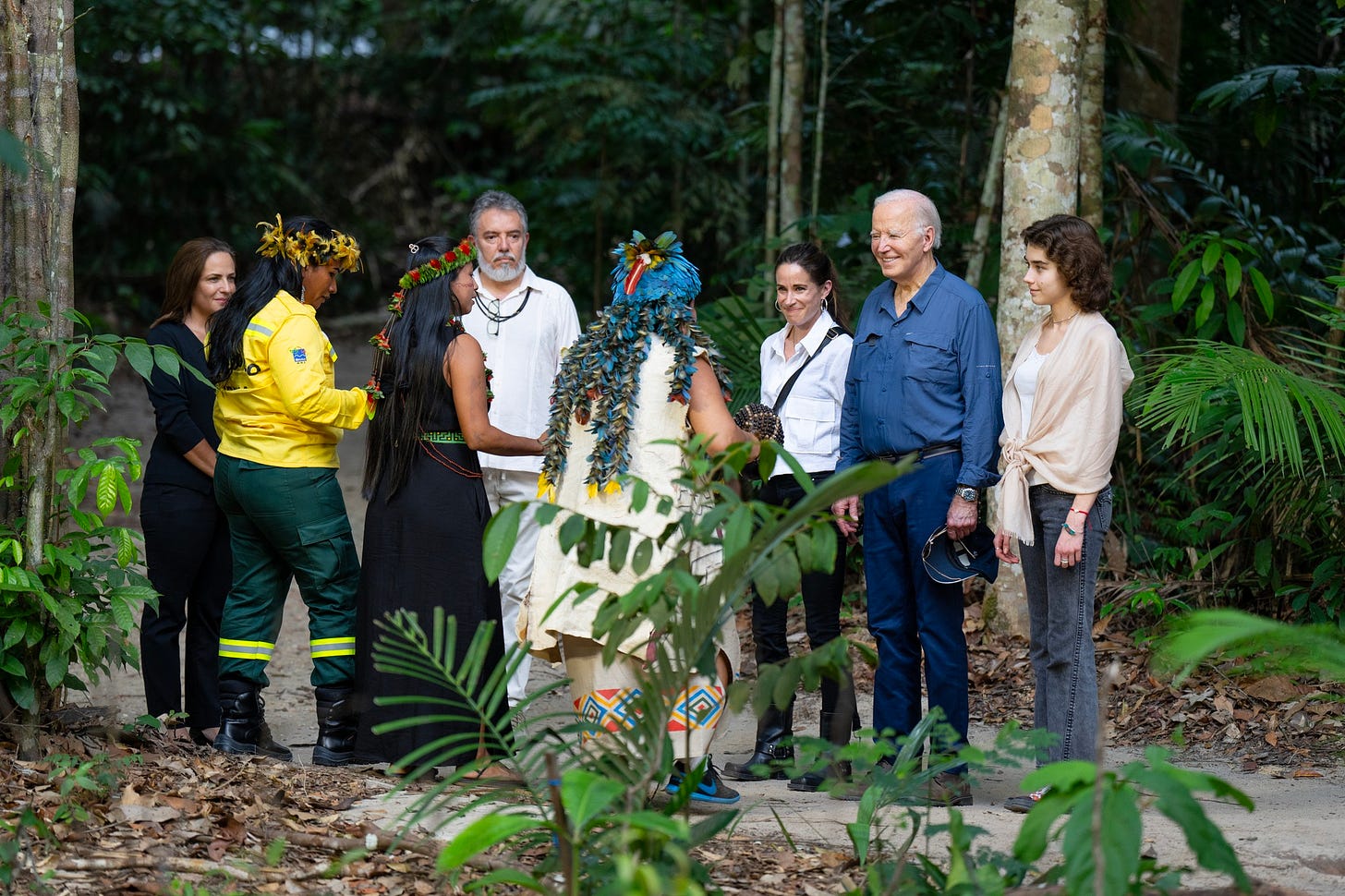President Biden and President Xi Jinping met in Lima, Peru, for their third in-person meeting following a telephone call in April 2024. Their discussions covered a broad range of bilateral, regional, and global issues, focusing on both areas of cooperation and points of contention. President Biden highlighted the importance of strengthening U.S. domestic foundations and aligning with global allies as part of his foreign policy approach. Both leaders agreed on maintaining open communication to manage competition and avoid conflict.
The discussion emphasized areas of cooperation, including counternarcotics efforts, where both nations committed to continued law enforcement coordination and regulatory actions. President Biden welcomed China’s regulation of synthetic drugs and precursor chemicals, along with measures targeting illicit chemical industries. Military-to-military communications were also praised, with both sides committing to ongoing dialogues to reduce tensions. On artificial intelligence, the leaders addressed risks and safety, underscoring the need to maintain human control over nuclear weapons and to develop AI technologies responsibly, especially in the military domain. They also recognized the importance of collaboration on climate change and people-to-people exchanges.
Regarding regional and global challenges, President Biden condemned the deployment of North Korean troops to Russia and expressed concern over China’s support for Russia’s defense industry amid the ongoing conflict in Ukraine. He reaffirmed the U.S. commitment to international law, freedom of navigation, and peace in the South and East China Seas. On Taiwan, President Biden reiterated the United States' unchanged one-China policy, calling for peace and stability in the Taiwan Strait and urging an end to destabilizing Chinese military activities.
President Biden also addressed concerns over China’s trade practices, emphasizing the need to protect U.S. technologies from misuse while balancing trade and investment interests. He raised human rights issues, including the unjust detention of American citizens in China, and expressed deep concern over cyberattacks targeting U.S. critical infrastructure.
Building on previous discussions at the Bali and Woodside summits, the two leaders stressed the importance of responsibly managing competitive aspects of the U.S.-China relationship. They underscored the need for peaceful coexistence, adherence to international laws, and open communication channels across diplomatic, military, commercial, and financial domains to prevent conflict and foster cooperation.
National Security Adviser Jake Sullivan provided an overview of the key outcomes from the meeting between President Biden and President Xi Jinping, emphasizing the importance of responsibly managing the U.S.-China relationship amid competition. The meeting resulted in progress on several fronts, including an agreement on maintaining human control over nuclear weapons to mitigate risks associated with artificial intelligence. This landmark statement marks a significant first in U.S.-China relations and lays the groundwork for further cooperation on AI safety and nuclear risk reduction. Both leaders also addressed shared interests, such as counternarcotics, climate change, and AI development, signaling areas where collaboration could continue.
However, the meeting also highlighted significant areas of contention. President Biden expressed concerns over China’s support for Russia’s defense sector, particularly its role in facilitating North Korea’s involvement in the Ukraine war. He urged China to use its influence to prevent further escalation of the conflict. Economic and trade issues were another major focus, with Biden criticizing China’s unfair practices, especially concerning advanced semiconductors and export controls. The leaders also discussed regional security challenges, including the Taiwan Strait and the South China Sea, where Biden underscored the need for peace, stability, and adherence to international law. Additionally, Biden pressed for the release of Americans unjustly detained in China, noting progress with the recent release of David Lin but emphasizing ongoing concerns.
The meeting atmosphere was described as candid and constructive, with moments of personal reflection on the long-standing relationship between the two leaders. Both Biden and Xi acknowledged the complexity and competitiveness of their nations' interactions, stressing the need to maintain open lines of communication. Biden emphasized the importance of stability during the U.S. political transition period and expressed his commitment to responsibly managing relations. While President Xi raised objections to U.S. export controls, Biden reaffirmed the rationale behind these measures, citing national security concerns.
Other topics included Haiti’s peacekeeping mission and Chinese cyberattacks on U.S. telecommunications, though no major policy shifts were announced. Both leaders agreed to build on today’s discussions, but Sullivan acknowledged uncertainty regarding continuing these policies under the next U.S. administration. The meeting reinforced the importance of leader-level engagement in navigating one of the world's most consequential and complex bilateral relationships, balancing areas of cooperation with ongoing challenges.
President Biden announced that the United States has surpassed his goal of providing over $11 billion annually in international climate finance, achieving a six-fold increase since FY2021 and establishing the U.S. as the largest bilateral provider of climate finance worldwide. This achievement includes scaling adaptation finance to over $3 billion annually under the President’s Emergency Plan for Adaptation and Resilience (PREPARE) and record-setting climate investments through the U.S. International Development Finance Corporation (DFC) and the Export-Import Bank (EXIM). The announcement coincides with Biden’s historic visit to Manaus, Brazil, where he became the first sitting U.S. president to visit the Amazon rainforest. His trip emphasizes the Administration’s commitment to addressing global deforestation and advancing nature-based solutions to combat climate change while strengthening collaborations with Brazil and Indigenous communities.
Key initiatives unveiled include a $50 million contribution to the Amazon Fund, bringing total U.S. support to $100 million, and the launch of the Brazil Restoration & Bioeconomy Finance Coalition, which aims to mobilize $10 billion in public and private investments for land restoration by 2030. Other notable efforts include a $37.5 million investment in large-scale Amazon reforestation projects, support for the Tropical Forest Forever Facility ($125 billion target fund), and partnerships for high-integrity forest carbon credits to support conservation in Brazilian states.
The Biden Administration is also advancing sustainable development through USAID investments, such as the $2.6 million Rainforest Wealth Project and $4 million to strengthen the Amazon bioeconomy. Collaborative programs address biodiversity conservation, support Indigenous-led land management, and bolster regenerative agriculture to reduce deforestation. U.S.-Brazil scientific and technical partnerships include renewable energy projects in the Amazon, advancements in forest monitoring technologies, and initiatives to combat illegal mining and mercury trafficking.
Additionally, President Biden signed a proclamation establishing November 17 as International Conservation Day, underscoring the importance of protecting ecosystems and biodiversity. The Administration's efforts have conserved over 45 million acres globally while expanding U.S. contributions to climate resilience and conservation at home and abroad, reflecting a comprehensive approach to tackling the climate crisis as an economic and environmental opportunity.
President Biden delivered remarks during his historic visit to the Amazon rainforest, emphasizing forests' critical role in combating climate change. Quoting Chico Mendes, a renowned Brazilian environmental activist, Biden highlighted the universal importance of forest conservation, describing it as a fight for humanity. Reflecting on his work as a senator in the 1980s, he recounted his efforts to implement debt-for-nature swaps, a program that has since protected millions of acres of forests worldwide.
During his address, Biden announced several new initiatives to preserve the Amazon and combat global deforestation. These include mobilizing hundreds of millions of dollars in partnership with a Brazilian company to reforest the Amazon and launching the Brazil Restoration and Bioeconomy Finance Coalition, which aims to mobilize $10 billion by 2030 to restore and protect 20,000 square miles of land. Additionally, the U.S. will contribute an extra $50 million to the Amazon Fund and support President Lula’s Tropical Forest Forever Fund. Biden also issued a global proclamation to conserve nature and highlighted bipartisan legislation to create a foundation for international conservation, leveraging public and private funds.
The president underscored the interconnectedness of environmental protection and economic growth, citing U.S. achievements in clean energy as proof. He highlighted efforts such as rejoining the Paris Agreement, spearheading the Global Methane Pledge, enacting historic climate laws, achieving record clean energy investments, creating jobs, and significantly reducing emissions. Biden reinforced that these actions demonstrate how environmental protection and economic prosperity coexist.
As he approaches the end of his presidency, Biden expressed pride in the strong foundation his administration has laid for continued progress on climate change. He voiced confidence that the clean energy revolution underway in the U.S. and globally is irreversible. Concluding his remarks, Biden called the Amazon the "heart and soul of the world," urging global unity to protect forests as a sacred legacy for future generations. He emphasized the historic responsibility to preserve the Amazon, describing it as vital to humanity’s shared future.
President Biden commemorated the first International Conservation Day by highlighting its significance in combating climate change and preserving the world’s ecosystems. The proclamation emphasized that conservation extends beyond protecting natural wonders; it safeguards livelihoods, preserves biodiversity, enhances ecosystem resilience, and ensures equitable access to natural resources. President Biden reaffirmed the U.S.’s commitment to conservation through national and global initiatives, stating that when nations collaborate to protect lands and waters, the benefits extend to everyone.
Domestically, the Biden Administration has advanced American history's most ambitious conservation agenda. This includes setting the first-ever national conservation goal to protect 30% of U.S. lands and waters by 2030 through the America the Beautiful initiative. Critical programs like the Freshwater Challenge aim to restore wetlands and waterways. Investments from the Inflation Reduction Act and Bipartisan Infrastructure Law have strengthened ecosystems, supported restoration efforts, and bolstered community resilience to climate change. The President also launched the American Climate Corps to engage a diverse generation of Americans in conservation efforts while advancing clean energy, environmental justice, and job creation.
Globally, the administration has taken significant steps to lead conservation efforts. President Biden rejoined the Paris Agreement, committed to net-zero emissions by 2050, and led global initiatives at COP26 to conserve forests and end deforestation by 2030. The administration has supported the High Seas Treaty to protect marine biodiversity and aims to conserve 30% of the oceans by 2030. It has also delivered record climate financing to assist developing nations in addressing climate change, including a substantial investment in the Amazon Fund and restoration projects across South America.
President Biden underscored the critical role of the Amazon and other major forests in mitigating climate change, describing them as the "lungs of the world." He supported Brazil’s restoration efforts, including the Brazil Restoration and Bioeconomy Finance Coalition. He endorsed President Lula’s Tropical Forest Forever Facility, a transformative initiative to preserve tropical forests while empowering local and Indigenous communities. The President concluded by urging collective action to protect the world’s most precious ecosystems, ensuring their preservation for future generations. With this proclamation, November 17, 2024, is officially designated International Conservation Day, reflecting a renewed commitment to global conservation and climate action.
President Biden is the first U.S. president in history to visit the Amazon rainforest






